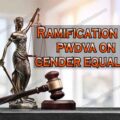
The Protection of Women from Domestic Violence Act, 2005 (PWDVA) was enacted in India to address the issue of domestic violence, which is a pervasive problem affecting women across the country.
It provides the following remedies to a woman:
Protection Order: A Protection Order is a court order that prohibits the abuser from committing any act of domestic violence or from entering the victim’s place of employment, residence, or any other specified place. The order is intended to protect the victim from further abuse.
Residence Order: A Residence Order is a court order that allows the victim to reside in the shared household or any other place of their choice. The order may also include an injunction prohibiting the abuser from dispossessing the victim or interfering with their possession.
Monetary Relief: The victim can claim monetary relief for the losses suffered due to the domestic violence, including medical expenses, loss of earnings, and damage to property. The court may award monetary relief based on the actual losses suffered by the victim.
Custody Order: A Custody Order is a court order that specifies the arrangements for the custody and maintenance of the children. The victim can apply for a Custody Order if they have children and want to protect them from the abuser.
Compensation Order: A Compensation Order is a court order that awards compensation to the victim for the injuries and harm caused by the abuser. The court may award compensation based on the severity of the injuries and the impact of the abuse on the victim’s life.
Interim Order: An Interim Order is a temporary court order that provides immediate relief to the victim before the final order is passed. The court may pass an Interim Order if it is satisfied that there is a prima facie case of domestic violence.
Some of the landmark cases related to the Act are:
Indra Sarma vs. V.K.V. Sarma (2009) – The Supreme Court clarified that the Act is a civil remedy, and not a criminal remedy, for the protection of women from domestic violence.
Sandhya Wankhede vs. Manoj Bhimrao Wankhede (2011) – The Bombay High Court ruled that the Act is a comprehensive law and covers all forms of domestic violence, including emotional abuse and economic abuse.
Hiral P. Harsora vs. Kusum Narottamdas Harsora (2016) – The Gujarat High Court held that the Act is a remedial and beneficial legislation and should be interpreted in a manner that advances the protection of women from domestic violence.
K. Srinivas vs. K. Sunita (2017) – The Supreme Court clarified that a wife can file a complaint against her husband and his relatives under the Act, even if they are not living together.
Anupama Bhatia vs. M/s. Vishal Dadlani (2018) – The Delhi High Court held that the Act can be invoked by live-in partners in a domestic relationship.
It is important to note that the remedies available under the PWDVA are in addition to the remedies available under other laws, such as the Indian Penal Code and the Code of Criminal Procedure. Victims of domestic violence can approach the police or protection officers to seek help and initiate legal proceedings under the PWDVA. The act provides for a fast-track procedure, and the proceedings are expected to be completed within a specific timeframe. The court is also empowered to issue any other order that it deems necessary to protect the victim from domestic violence





